#non-western poets
Text
Make perfect the present (Dream/Hob Western A/B/O AU) Chapter 1 is up!

Make perfect the present || Dream of the Endless/Hob Gadling || Explicit || 1/17
Alternate Universe - Western, Non-Traditional Alpha/Beta/Omega Dynamics, Alpha/Beta/Omega Dynamics, Western, Cowboys & Cowgirls, Historical References, Probably inaccurate horseback riding, Poetry, References to Oscar Wilde, Period-Typical Sexism, Victorian Attitudes, Gender Identity, Gender Issues, Attempted Sexual Assault, Gun Violence, Blood and Violence, Rap Battles, Bandits & Outlaws, Masturbation, Vaginal Sex, Vaginal Fingering, Anal Sex, Anal Fingering, Pining, BAMF Hob Gadling, Hob Gadling Saves Dream of the Endless | Morpheus from Roderick Burgess, POV Dream of the Endless | Morpheus, Kidnapping, Period-Typical Racism
In the summer of 1895, Morpheus Sanfin – poet, omega, and disappointment to his wealthy father – flees England on the heels of Oscar Wilde's imprisonment for gross indecency out of fear that he will be condemned for the same unnatural urges.
Seeking a new life in America away from the stifling hand of his father and the expectations of his sex, Morpheus sets out for California with Hob Gadling, a mustang driver who agrees to guide him, not knowing that along the way they will encounter natural wonders, the ghosts of their pasts, and perils that will force Morpheus to reconcile with both his sex and his feelings for his new companion.
Chapter 1 is up on AO3!
The fantastic header is from art done by @fishfingersandscarves. Thank you so much darlin for letting me use it <3
#the sandman#dreamling#dream of the endless#hob gadling#my fic#dream/hob#dream of the endless/hob gadling#alpha/beta/omega verse#western AU#cowboy AU
349 notes
·
View notes
Text
director's commentary for this post (lmao) because I like yapping
the reason why I choose these artworks is not just because they looked good, I thought it was interesting how they treat colors, light and rot
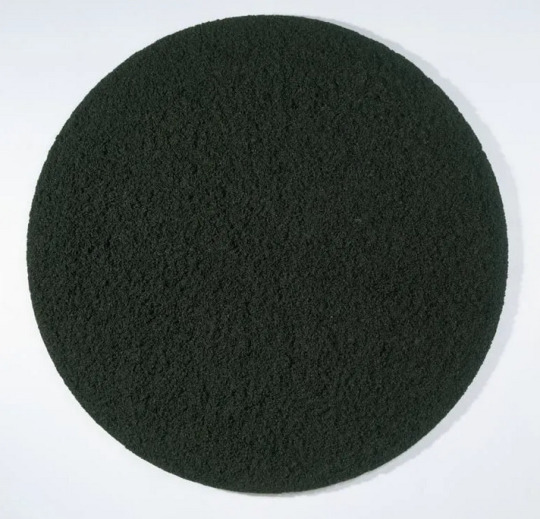
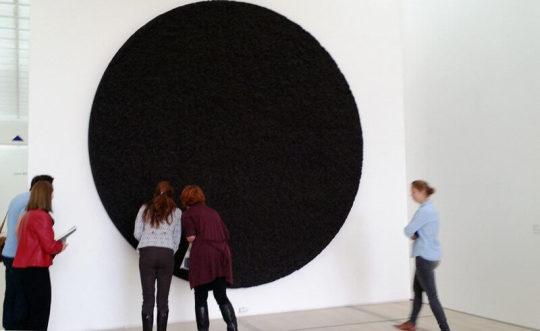
Damien Hirst's Black Sun is made of many dead flies, people have said that this artwork smells gross up close. Its theme is obviously death and disgust (like most of his works), he has also said the flies represent people, and quotes Hobbes saying that people's life without a government is bad and tragic (which I HEAVILY disagree with)
Hirst sells his works for millions of dollars, it's highly commercialized, some have accused him of money laundering and such. Insert the Wompty-Dompty Dom Centre thought:
Problem
It's Wednesday evening and something heinously exciting is under way. People have gathered beneath the billowing roof of an oddly shaped trophy building, sipping wine and exchanging opinions. 29-year-old wunder-twins Guy and Keith Joost are the stars of the show, with their bomber jackets and white sneakers -- head curators of this art exhibition. It's the wompty-dom-di-dommiest event of the year and all the cool kids have RSVP’d. Where are you, if you are not there?
Solution
You're at home, stupid cop, not with the art crowd. You hate them, everyone hates them, even they hate themselves. It's nauseating -- an industry built on sprezzatura and sparkling wine. And, let’s be honest, tax evasion schemes. The Wompty Dompty Dom Centre is the heart of this unholy symbiosis of esthetics and tax optimization, and now that you've internalized it – you can have a piece too!
personally, for me, it invokes disgust both on an aesthetic level (dead flies) and in a conceptual level (rich guy using death to make millions). Tieing this into black being the color of money in Elysium, and the end of the world.

Malevich's Black square is a painting without an object, it doesn't represent the material world, it is independent of it. but at the same time, black is the density of matter in the white empty space.
He said this about this art: "[Black Square is meant to evoke] the experience of pure non-objectivity in the white emptiness of a liberated nothing." "It is from zero, in zero, that the true movement of being begins." (x) ‘In the year 1913, trying desperately to free art from the dead weight of the real world, I took refuge in the form of the square.’ (x)
Important context for this work (like many other black paintings) is that it was made around the time of the world wars, and the russian revolution. Black paintings express the trauma of the world wars, and in this case the revolutionary approach to art too.
quoting from the article I linked:
Malevich had been collaborating with the musician Mikhail Matyushin and the poet Aleksei Kruchenykh on a manifesto which called for the rejection of rational thought. They wanted to overturn the established systems and hierarchies of Western society. Together with poet Velimier Khlebnikov they staged Victory over the Sun, where the characters aimed to abolish reason by capturing the sun and destroying time. The libretto used Kruchenykh’s zaum – a new language of sounds that had no meaning. This sparked something in Malevich.

Similar things apply to White on white. The Moma website describes it better than I would:
[Malevich] "wanted White on White to create a sense of floating and transcendence. White, Malevich believed, was the color of infinity and signified a realm of higher feeling, a utopian world of pure form that was attainable only through nonobjective art. Indeed, he named his theory of art Suprematism to signify “the supremacy of pure feeling or perception in the pictorial arts”; and pure perception, he wrote, demanded that a picture’s forms “have nothing in common with nature.” In 1918, soon after the Russian Revolution, the connotations of this sense of liberation were not only aesthetic but also social and political. Malevich expressed his exhilaration in a manifesto one year later: “I have overcome the lining of the colored sky. . . . Swim in the white free abyss, infinity is before you.”

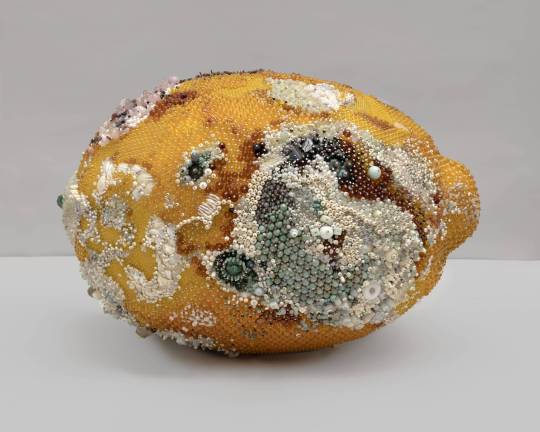
These molding fruits made out of gemstones by Kathleen Ryan make me think of Damien Hirst's bedazzled Skull artwork, decadence, kitsch, death. The gemstones make the mold feel like it has value, importance, like it's almost sacred. The pale as a "sacred and terrible smell"

Rothko's paintings heavily empathize colors, paintings like these invite us to really experience those colors and be moved by them.
From the Disco Elysium artbook:
Eyes are direct, unmediated input to the brain. You like or dislike something before you have a chance to reason about it. It affects you emotionally without offering you a chance to throw up intellectual defenses first. Witnessing death and good art are materially equivalent experiences: they are visual information transmitted straight to the centers of emotion by way of the eye.
This might explain why a person could tear up in the presence of a Rothko painting. If you’re a sensitive enough instrument, seeing his Orange, Red, Yellow in real life feels intense. It doesn’t work on a computer screen though, you’re just staring at some bright pixels imitating the appearance of the painting the same way seeing a dead person is different from seeing a picture of a dead person.

El Lissitzky was also an important figure in russian avant-garde, like Malevich. Well. I put this one in here cause it looked nice and because of the theme of light and the lack of (it's a gelatin silver photograph).
maybe this adds something to the discussion of the symbolism of colors and light in Elysium
#long post /#I love art history and talking about art so much#what do i tag this#its going into my#de meta#tag
73 notes
·
View notes
Note
In A Guildsman Goes Forth to War, what can you tell us about fae society? I'm assuming they're monarchies, feudal or absolute? Do they bear any resemblance to Celtic society? Do they practice slavery? What of their gender dynamics? Etc
Great question!
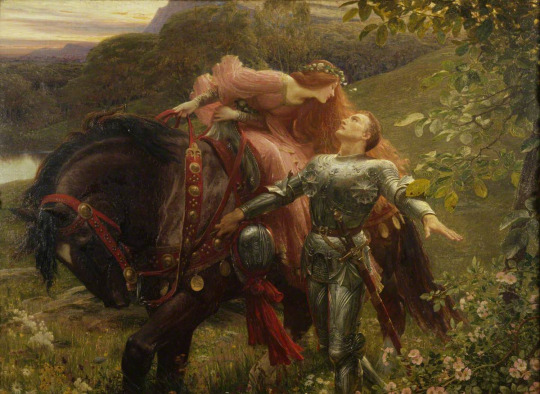
So there's a lot that I'm not going to share with you, because the fae/Fair Folk/etc. are supposed to be a mysterious people who live in their own realm that connects to the human world via thin places in the forests and underhill and deep in the mountains or underground rivers, and humanity doesn't particularly understand them very well despite centuries of intermarriage, as the fae are both very cryptic and contradictory in the information they've shared with their Gentry kin.
Government
As far as humans have been able to glean, the Fae do organize themselves into Courts that seem close enough to European feudal systems that the leading families of Europe can do business with them when it comes to dynastic marriage alliances and diplomatic relations.
That being said, status and power in Faerie society don't seem to be based in land as they are among humans. (In the interests of full disclosure, I'm borrowing some ideas here from the Feywild in D&D.) As far as people have been able to glean from correspondence and diplomatic and cultural interactions, titles are based on elements of nature (the Duke of Hoarfrost, the Viscount of Watermeadows) or from emotions (the Lady of Wistful Rememberance, the Prince of Sorrow), or from ideas and beliefs (the Duchess of the Dark Side of the Moon claims to have once been a handmaiden to the goddess Selene).
Quite a few scholars of geography and history from the leading universities have theories and taxonomies about how Faerie society is organized, but they're all second-hand and can offer only partial explanations and there's absolutely no consensus about what's going on. It does not help that the rare diplomatic missions or marriage parties that go to Faerie from the human world rather than in the other direction tend to report memory issues, such that much of what is recorded owes more to dream logic than accurate observation. Needless to say, this has been a rich vein of material for poets, playwrights, and painters only, and intensely frustrating for academics and statesmen.
Culture
Faerie culture is highly localized in accordance with regional folklore and mythology, although scholars disagree whether human folklore is a record of pre-historical encounters with Faerie, or whether the Fae pattern themselves after the human cultures they interact with.
So for example, the Fae of Éire, Alba, Anglia, and northern Gallia seem to correspond to Gaelic and Brythonic literature, Arthuriana, and the Matters of Britain and France. In the Sacrum Imperium and the Danelaw, however, the dominant Fae cultures are distinctively Germanic and Scandinavian - whether that's the Rheintöchter of the Rhineland and Palatinate, or the dvergr who predominate in Bavaria and the Hapsburg lands or the trollkind and various álfar in the land of the Northmen. In much of southern Europe around the Mediterranean, one is much more likely to encounter Faerie peoples recognizable to students of Greek and Roman mythology: many Gentry from the Lega or the western half of the Rhōmaîoi-Rashidun Federation claim descent from oreads, naiads, nereids, satyrs and other bloodlines.
Human scholars are particularly confused by the fact that all of these different peoples all call one another "cousin," no matter whether they belong to the more humanoid elfkind or the distinctly non-human trollfolk or even the potentially fictional or extinct dragons.
Class and Slavery
As already suggested, Faerie society seems to have some sort of a hierarchy, but it does not seem to be one based in the inheritance of land passed down from generation to generation. Rather, as far as humans can tell, status seems to be associated with proximity to or control of or possession of or identification with magical power from various sources.
What does seem to be the case is that those with more power can command those with less, and Faerie embassies ubiquitously feature both vips with titles and what appear to their servants, but there is no consistency on which kinds of fae serve and which rule. Human visitors and diplomats are very unsure whether this consistutes a caste system or clientilism, because the Fae themselves speak in rather vague terms about "obligations" and "debts" and "true names."
Gender
Again, humans have a rather hard time understanding Faerie gender norms - and are rather unsure whether various Fae kinds have genders and how many they have. What is known is that, among what passes for royalty and nobility in Faerieland, there is a tendency for the female to be announced first - correspondence often arrives in the form of "Queen Titania and King Oberon" or "The Baroness and Baron"- which suggests a slight tendency to the matriarchal, but that is mere supposition. Human cultural conservatives both within and without the Church do grumble about the "immodest" and "amazonian" habits of Faerie women when they comport themselves in their visits to human society or in their Gentry marriages, but they make sure to do so under their breath.
26 notes
·
View notes
Text
Biographical movies and dramas about writers:
Tolkien (2019) - about JRR Tolkien
The Edge of Love (2008) - about Dylan Thomas
Set Fire to the Stars (2014) - about Dylan Thomas
Colette (2018) - about Sidonie-Gabrielle Colette
Wilde (1997) - about Oscar Wilde
The Trials of Oscar Wilde (1960) - about Oscar Wilde
My Salinger Year (2020) - about JD Salinger
Rebel in the Rye (2017) - about JD Salinger
Mary Shelley (2017) - about Mary Wollstonecraft Shelley
Gothic (1986) - about Mary Wollstonecraft Shelley
Shakespeare in Love (1998) - about William Shakespeare
Sylvia (2003) - about Sylvia Plath
Dickinson (2019-2021) - about Emily Dickinson
A Quiet Passion (2016) - about Emily Dickinson
Vita & Virginia (2019) - about Virginia Woolf
Becoming Jane (2008) - about Jane Austen
Miss Austen Regrets (2007) - about Jane Austen
Kafka (1991) - about Franz Kafka
Byron (2003) - about Lord Byron
Total Eclipse (1995) - about Paul Verlaine
Capote (2005) - about Truman Capote
Rowing with the Wind (1988) - about the Romantic Poets
Infamous (2006) - about Truman Capote
Quills (2000) - about Marquis de Sade
Neruda (2016) - about Pablo Neruda
Juana Inés (2016) - about Sor Juana Inés de la Cruz
Daphne (2007) - about Daphne du Maurier
Priest of Love (1981) - about DH Lawrence
Little Ashes (2008) - about Federico Garcia Lorca
Lope (2010) - about Lope de Vega
Howl (2010) - about Allen Ginsberg
The Last Station (2009) - about Leo Tolstoy
Young Goethe in Love (2010) - about Johann Goethe
Tom & Viv (1994) - about T.S. Eliot
Céleste (1980) - about Marcel Proust
Hemingway & Gellhorn (2012) - about Ernest Hemingway
Balzac: A Life of Passion (1999) - about Honore de Balzac
The Man Who Invented Christmas (2017) - about Charles Dickens
Shirley (2020) - about Shirley Jackson
Goodbye Christopher Robin (2017) - about Alan Alexander Milne
Heart Beat (1980) - about Jack Kerouac
In the Heart of the Sea (2015) - about Herman Melville
Notes: Not all of the films on this non-exhaustive list are entirely “about” the lives of their respective writers to a tee. I cannot vouch for the accuracy or quality of all of these movies. I’ve only seen about 75% of these films personally. And yes, I know this list is very Westernized – I’m working on it.
#if any kind person wants to make a letterboxd list with these#be my guest and send me the link as well por favor so i can save it#period drama#period film#films#movies#filmblr#film blog#movieblr#movie blog#letterboxd#mary shelley#oscar wilde#emily dickinson#jrr tolkien#poetry#poets#biopic#film recs#film recommendations#movie rec list#historical fiction#historical drama#dark academia#dark academia aesthetic#favourite movies#film student#jd salinger#dylan thomas#truman capote
30 notes
·
View notes
Text
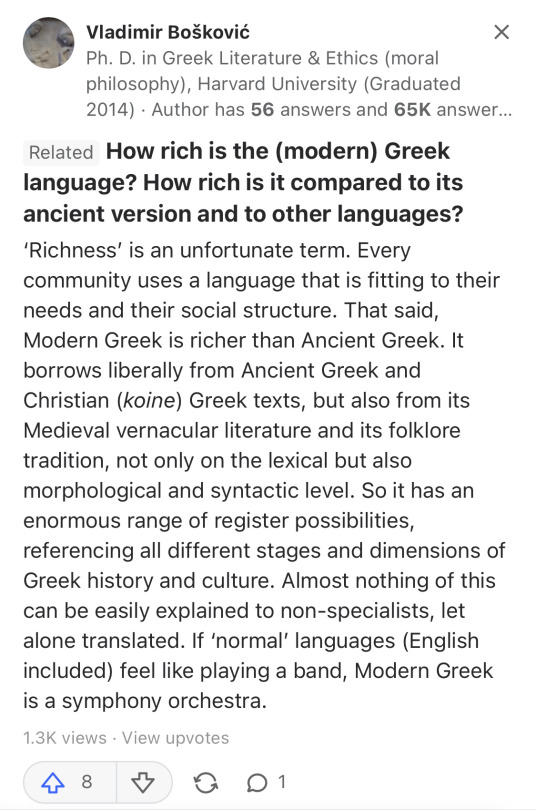
This is something brilliant I found on quora. Aside from the band-orchestra comparison that I have no opinion on as I should know many, many languages to dare tackle that, and which is a parallel that could perhaps only be justified coming from a man passionate enough to get a PhD in Greek literature and ethics, Mr Bošković is actually on point in what he says.
Typical western academia gets wet over Ancient Greek and typically scorns Modern Greek without a proper explanation, to the point of just referring to one form of the language: Greek, and calling it dead. In their minds, there can only be one form of Greek, the ancient one, and it is dead for good. Modern Greek doesn’t belong with their academic and lingual concerns.
But Bošković, who has obviously studied a greater span of the Greek language than the average stuck-up classicist, puts it so well and in such a short and simple text that I could never do it. I always thought Modern Greek is more flexible than Ancient Greek but I couldn’t explain why well. Here it is then: what many don’t realise is that Modern Greek operates in a very liberal fashion. It takes elements from large lingual pools. It has the Ancient Greek pool all to itself, to take elements at will. It can choose between very archaic, Koine / biblical / medieval or folk neo-linguistic elements or fuse them all together, technically without restrictions. The historical contact to Latin, Italian, Turkish, Slavic, Arabic and Albanian populations gives it access to the Romantic, Anatolian, oriental and non-Greek Balkan pools. Modern Greek has a very good ability to bend foreign elements enough to make them adjust to the Greek core of the language, instead of adjusting to them (ie all foreign loanwords are bent to follow Greek grammatic rules of inflection and their vocalisations usually change enough so that they are entered smoothly in the language). The local idiomatic element is also significant in every region and is particularly alluring in prose and verse (hence my recent comment that I prefer modern - but NOT contemporary - Greek prose).
That doesn’t mean that I don’t love Ancient Greek prose and verse. But here is the crucial nuance: the ancients and medieval people did their best to write in the highest form of the language they could master. When we read an ancient text, we witness the earnest efforts of the ancient poets and writers to be glorified through their writing.
Modern speech is unfortunately deteriorating* and we can’t compare the potential of the two ages of the language. Contemporary writers aren’t putting an effort to write in the highest lingual form they can master. On the contrary, they strive to be relevant and, in fact, as non-challenging as possible, so that they will cater to a wide, mainstream audience. And because everyone can write nowadays - it is not an activity saved for the wisest or most educated - there is a load of mediocre lingual usage inside which a specimen of high lingual form can be viewed as eccentric, pretentious and eventually undesirable.
Because of this, Modern Greek cannot utilise all its tools anymore (as well as many other languages to their own degree, of course). Reading the Iliad in its original has been fantastic so far and I was wondering why we can’t write like this anymore but now I am realising that there is nothing to prevent us from doing it from a technical aspect. There are no dead words in Greek. There are words which have become rarely used enough that some people would consider you a weirdo for using them and others would themselves refuse to learn, convinced there is no use in taking an extra step. Words that are recorded in texts, words whose meaning we know, can’t be dead, even if they are rarely used. It’s the obsession of the average person to follow the mainstream trend that threatens a word more than anything else. Another fact is that Greeks of different ages fluctuate between different forms of grammar, unsure whether a more archaic or more modern inflection is appropriate. The truth is that there is no wrong way, however Greek linguists lately try to wipe out older, more archaic forms in exchange for newer, simpler ones. The intent is always to become as approachable, as unchallenging as possible. There is no de facto death of older types of usage as long as they are recorded and we know how they work and some of us use them still - it’s literally a few linguists trying to give Modern Greek a distinct, simpler identity by ignoring the language’s most crucial characteristic: its flexibility.
Νεφεληγερέτης Ζεύς is a common characterisation of Zeus in the Iliad (Nepheliyerétis Zeús - Zeus the Cloud-gatherer) . There is no real reason to prevent someone from using this phrase intact nowadays, as both roots of the first word do exist in modern Greek. And even if someone was too self-conscious about writing so ambitiously, they could do with a more modern or folkish version like νεφελοστοιβάχτης or συννεφοστοιβάχτης or νεφομαζωχτής or νεφελαθροιστής (ie nephelostiváchtis, sinephostiváchtis, nephomazochtís, nephelathristís). Would they though? No, they wouldn’t. Why take the extra step?
My point is, Modern Greek is an overlooked, extremely potent language and we do exactly nothing with or about it.
*Whoever is quick to argue that a language never deteriorates because it always morphs into a reflection of its respective nation / society and its needs should either stop fooling themselves or immediately get alarmed by the current state of the respective society at question.
124 notes
·
View notes
Text
As a leading light in the constellation of “terrorism experts,” Jerrold Post has proposed that terrorists suffer from pathological personalities that emerge from negative childhood experiences and a damaged sense of self. Post argues for two terrorist personality types, depending on the specific quality of those childhood experiences. First, Post suggests, there is the “anarchic-ideologue.” This is the terrorist who has experienced serious family dysfunction and maladjustment, which lead to rebellion against parents, especially against the father. Anarchic-ideologues fight “against the society of their parents . . . an act of dissent against parents loyal to the regime.” Second, there is the terrorist personality type known as the “nationalist-secessionist”—apparently the name indicates “a sense of loyalty to authority and rebellion against external enemies.” During childhood, a terrorist of this personality type experienced a sense of compassion or loyalty toward his or her parents. According to Post, nationalist-secessionists have pathologically failed to differentiate between themselves and the other (parental object). Consequently, they rebel “against society for the hurt done to their parents . . . an act of loyalty to parents damaged by the regime.” Both the anarchic-ideologue and nationalist-secessionist find “comfort in joining a terrorist group of rebels with similar experiences.” The personality defect model views terrorists as suffering from personality defects that result from excessively negative childhood experiences, giving the individual a poor sense of self and a resentment of authority. As Ruby notes, “Its supporters differ in whether they propose one (Kaplan), two (Post and Jones & Fong), or three (Strentz) personality types.”
What all these models and theories aim to show is how an otherwise normal individual becomes a murderous terrorist, and that process time and again is tied to the failure of the normal(ized) psyche. Indeed, an implicit but foundational supposition structures this entire discourse: the very notion of the normal psyche, which is in fact part of the West’s own heterosexual family romance—a narrative space that relies on the normalized, even if perverse, domestic space of desire supposedly common in the West. Terrorism, in this discourse, is a symptom of the deviant psyche, the psyche gone awry, or the failed psyche; the terrorist enters this discourse as an absolute violation. So when Billy Collins (the 2001 poet laureate) asserted on National Public Radio immediately after September 11: “Now the U.S. has lost its virginity,” he was underscoring this fraught relationship between (hetero)sexuality, normality, the nation, and the violations of terrorism.
Not surprisingly, then, coming out of this discourse, we find that another very common way of trying to psychologize the monster-terrorist is by positing a kind of failed heterosexuality. So we hear often the idea that sexually frustrated Muslim men are promised the heavenly reward of sixty, sixty-seven, or sometimes even seventy virgins if they are martyred in jihad. But As‘ad Abu Khalil has argued, “In reality, political—not sexual—frustration constitutes the most important factor in motivating young men, or women, to engage in suicidal violence. The tendency to dwell on the sexual motives of the suicide bombers belittles these sociopolitical causes.” Now of course, that is precisely what terrorism studies intends to do: to reduce complex social, historical, and political dynamics to various psychic causes rooted in childhood family dynamics. As if the Palestinian Intifada or the long, brutal war in Afghanistan can be simply boiled down to bad mothering or sexual frustration! In short, these explanatory models and frameworks function to (1) reduce complex histories of struggle, intervention, and (non)development to Western psychic models rooted in the bourgeois heterosexual family and its dynamics; (2) systematically exclude questions of political economy and the problems of cultural translation; and (3) attempt to master the fear, anxiety, and uncertainty of a form of political dissent by resorting to the banality of a taxonomy.
Monster, Terrorist, Fag: The War on Terrorism and the Production of Docile Patriots, Jasbir K. Puar & Amit Rai, 2002 [muse]
30 notes
·
View notes
Text
Like Crazy (2023) as a discussion of (queer) loneliness
hiiii anyways i keep saying Like Crazy is incredibly bisexual/queer and its been hard to explain why without writing an essay so. without further ado:
*DISCLAIMER* I am not claiming I know anything about how Jimin identifies or the intended message of the album, nor am I claiming my interpretation as above any other. This is just my reading of FACE and Like Crazy as a gay person of colour and a grad student writing a thesis on transness where I discuss topics of loneliness as a systemic form of violence and intimacy. I am also looking at this from a very Western perspective; though I know there are likely many Korean and likely queer Korean authors, theorists, and poets evoking similar ideas, I’ll be making reference to authors that I am familiar with who are better known in a Western context.
Loneliness as a cycle of abjection
“I want to introduce Jimin’s true feelings that I didn’t bring up anywhere else. I looked back on myself and honestly expressed my […] emptiness and loneliness.”
I don’t think it would take a particularly high level of analysis to conclude that FACE, and Like Crazy more specifically, are meant to explore loneliness as a process of self-alienation. Non-binary author Olivia Laing describes the cycle of loneliness as one where:
“[…] the lonelier a person gets, the less adept they become at navigating social currents. Loneliness grows around them, like mould or fur, a prophylactic that inhibits contact, no matter how badly contact is desired. Loneliness is accretive, extending and perpetuating itself.”
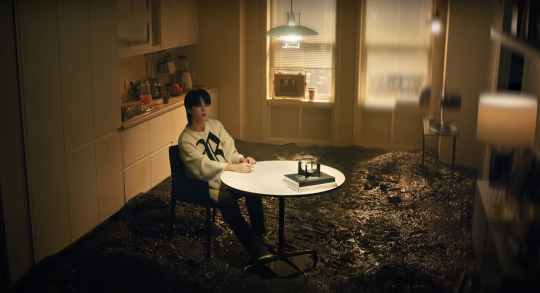
It’s very clear from the beginning of the music video for Like Crazy that Jimin struggles with reconciling a comfort in loneliness with a need to experience intimacy. Regardless of his efforts, the rot of loneliness is never far, seeps in through the walls and stains his hands. As (ironically) relatable of an experience as loneliness is, it does not occur in a vacuum. Rather, the unique experience of queer loneliness and rejection is one riddled by othering from acceptable sexuality and gender experiences and an inability to be framed within normative categories. Robert Phillips, scholar in language analysis as it pertains to gay male sexuality, wrote on abjection through a trans studies framework. To him, the process of horror or unease that defines abjection, through which the “other” is separated from and by an “us,” goes beyond “casting out” and becomes more interactive process; the hegemonic is protected by rejecting whatever does not conform, that is ambiguous, that does not fit in box. “The anxiety at the root of this unease with transgender subjectivity can be traced back, in part, to a fear of the ambiguous.” Loneliness, like queerness, acts as a sort of mark of Cain, a characteristic that becomes so impeded in our being that it if first noticeable and then rejectable.

Despite being marked by loneliness, Jimin is the center of attention for the first act of the music video, featuring him crowd surfing and posing delicately for pictures. Yet, despite his yearning, he makes no move for intimacy. The music video implies the possibility that it is the result of this very hypervisibility as a figure of softness and boyishness, inviting parallels to be made here with the foucauldian references and the power play between surveillance and identity in other areas of the album, namely Set Me Free Pt. 2 (a discussion for another post for another time…..).
Hedonism as an escape
“[Like Crazy] expresses the emotions of the moment when you run away from reality to forget your wounds.”
The overlap between loneliness and overt sexuality is why eroticism is so culturally important to queer communities. Like Crazy explores desire and intimacy through what can be called a queer lens, as an escape and as an unsuccessful means to being perceived and acknowledged outside of suffering. The whole poem is absolutely beautiful, but a specific excerpt of gay Asian-American poet Ocean Vuong’s On Earth We’re Briefly Gorgeous comes to mind: “Don’t we touch each other just to prove we are still here? I was still here once.” As Like Crazy, Vuong’s poem discusses intimacy as the antithesis to loneliness. To be intimate is to come out of ones self. The erotic becomes an avenue to salvation (I will permit myself a little shoutout to Christian mythos by drawing parallel to the Song of Songs - we all dream of kissing God, of laying with the presence of something larger than us, and finding deliverance from it!).

Like Crazy communicates a power struggle between desperation for intimacy and an addiction to loneliness. What Jimin says about it and the juxtaposition with the actual visuals of the music video paints the picture of an attempt to build closeness on the foundations of perpetual solitude. In Like Crazy, closeness is futile. Loneliness becomes a lifelong lover, and intimacy an occasional affair. Though still better than perpetual solitude, it is marked by disillusion: “I’d rather be lost in the light.” Rather than evoke the image of a passionate one-night-stand, it acknowledges of the persistence of loneliness. queer latino write John Paul Brammer evokes this feeling:
“Loneliness, I find, continues too. Our relationship with solitude is one of the most important ones we have in this life. No matter how full and vibrant and loud we make things, the quiet always finds us.”
Despite Jimin’s desires for closeness, we don’t actually see him making any move for closeness. Rather, despite his best efforts, he walks against the course of those around him in a repeated shot before knocking the camera’s lens away; again, a parallel to the surveillance of set me free, as well as a possible denial of him pace against the grain.
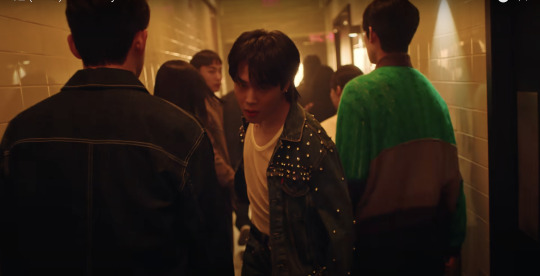
Queer desires and longing
“Let me have a taste / Give me a good ride.”
For non-queer people, what is difficult to understand in the particularities of queer loneliness is its entwining with desire. It’s an unspeakable yearning - as much in the ways it is indescribable as it is often life-threatening to do so. It is a profound sense of non-belonging felt in the knowledge that you are not as others are or see you because of a fundamental issue with how - and for whom - you experience desire. As a result, the erotic and sexuality along the margins of what is normative, i.e. reproductive cisgender heterosexual missionary sex after marriage, are profoundly radical and embodied manifestations of queer desire: kink, bondage, leather, sadomasochism, casual sex, chemsex, etc. all contribute to this expression of queer intimacy and self actualization.
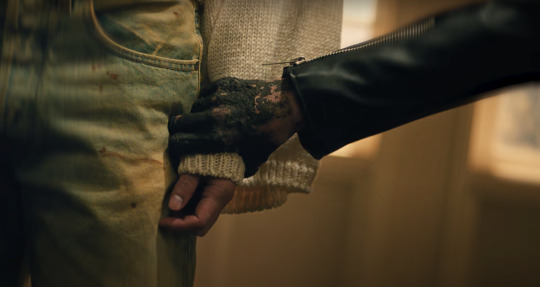
I know I’m being a little dramatic in the set-up here but it is really difficult to try to explain this inherent outcasthood to straight people. It is such a specific experience that is so untranslatable, and yet it is a feeling that I pick up so strongly in the Like Crazy music video. The remedying of sexuality with the profound alienation that queer people feel up until, very often, a dramatic and self-destructive discovery in young-adulthood, is something that straight/cis people just can’t understand. Leading African queer scholar and (erotic) writer Keguro Macharia writes:
“what is the taste of loneliness? / salt-bitter-sweet-nothing / after midnight, in cars, in booths in sex shops, in dark bedrooms, in anonymous hotel rooms, encounter after encounter, trading orgasms for ‘hold me’ and ‘let’s cuddle’ ‘if I suck you off, will you cuddle with me’ ‘if I let you fuck me, will you cuddle with me’.”
I’m not knowledgeable on kink culture so I won’t get too into it but I think it’s really interesting how submissive the lyrics come off. What is striking about the way Like Crazy approaches desire that sets it apart from any generic “we found love in this club”-type pop song is its desperate tone rather than one that boasts virility with promises of a “good time.” Instead, Jimin is the one pleading.
Queer loneliness as liberation
“She’s saying, ‘Baby, don’t think about it / There’s not a bad thing here tonight.”
Like Vuong’s poem, Like Crazy could also become a larger question on a heterosexual culture that is increasingly anxious about bodies and touch. The music video can be clocked as having the intention to discuss the erotic - the Robert Mapplethorpe reference is enough to assert this - yet it does so very tamely. Everyone is clothed, no one touches too much, the atmosphere is fun, chill, controlled. Jimin, despite his expressed desperation for closeness and hedonism as told through the lyrics and through his interaction with those at the party, through the careless throwing back of shots, does not find what he needs. The environment is too controlled, too “straight” (as in “proper,” or “innocuous”). He himself does not find any intimacy. He stays at the center of it all, untouched, and not daring to get closer.
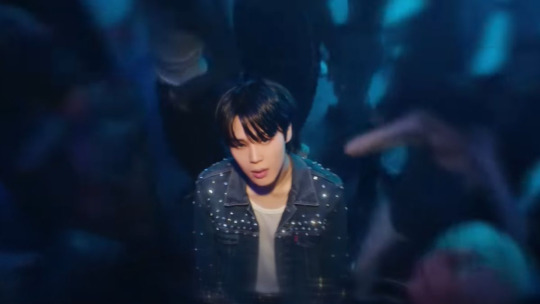
Something that is reflected by a lot of trans theory writers (some whom I’ve read including Paisley Currah and Dean Spade) is that the normalization process in inclusion produces and reproduces ideas on who is and “insider” and who is an “outsider.” I read a bit of Melissa Caroll’s thesis on the political implications of queer loneliness as part of my own (much shorter) thesis. In it she discusses how “straight” culture, through the aforementioned social accounting processes, delimit the realm of the socially accessible, in a process Denise Riley calls loneliness. Caroll says:
“Currently, any public declaration that “I am lonely” presumes that we are registering this feeling based on what we have been led to believe that loneliness, as a term, means: sad, alone, lacking, in need or want of friends, odd, bizarre, queer, and unhappy.”

Heteronormative abjection of queer and trans modes of being are increasingly reclaimed as constructive and disruptive political strategies. As postmodernist feminist scholar Julia Kristeva writes, abjection is “the place where meaning collapses.” Rejection of inclusion to instead embody abjection and loneliness is another cornerstone of queer self-affirmation that is explored, again, through the erotic and the sexually obscene. The tame nature of the music video, Jimin’s desperation, implies a dissociation from himself and a refusal to face himself. There is an acknowledgement of the futility of his desires for closeness beyond what he is “marked” for, that it will “break” him yet he refuses to be “saved.”
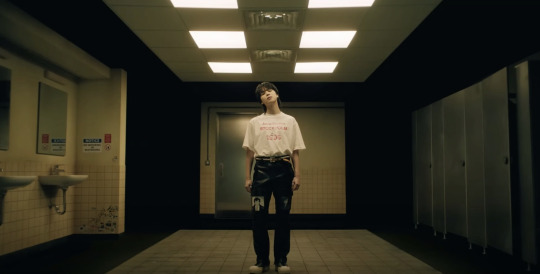
So, regardless of whether Like Crazy truly is an attempt to explore the unique nuances of queer loneliness, it is clear that what it does discuss is struggle against self. The music video depicts not romantic rejection or conflict, but rather an imposed alienation. A self-rejection from an objected self and from a normative way of life. The stained, leather clad hand presumably belonging to Jimin himself dragging him to the party, the knocking away of the camera as a refusal to accept a self or to showcase that “wound,” the interplay between the warm shots of androgyny and desire contrasted with the cool setting of the club. The premise of the music video and its use of a movie itself is a refraction of this longing and abjection in a way; what does it say to attempt to translate a profound feeling of disorientation and loneliness within a normative context through the reference of a romance film featuring a White, conventionally attractive, heterosexual, cisgender, normative couple as a man of colour often read as gender non-conforming?
TLDR: Whether Like Crazy or FACE globally means to discuss queer loneliness and desire, the way they are ultimately explored and the play on gender and belonging imply a framework that is, intentionally or not, queer.
#this is excessive i know. im sleepy n i need to shower ill prbably come back together and chop it down to half wtv#im not joking when i say its long. be warned.#essayposting#🏹
139 notes
·
View notes
Text
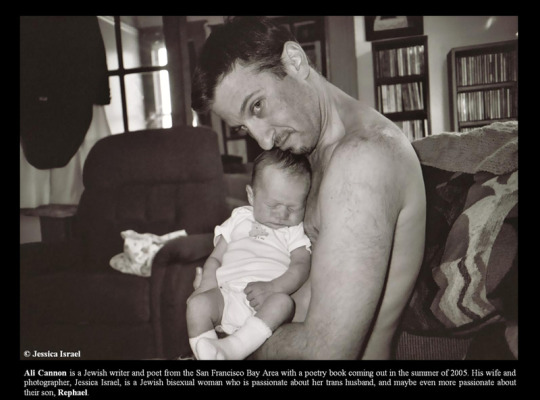
ID: A black and white photograph of Ali Cannon holding his baby son close to his chest and looking at the camera. Cannon is shirtless, and has short dark hair and facial hair. He has been photographed in a room with a sofa, armchair and multiple book shelves. His son is resting his head on his father’s chest and seems to be asleep. There is a tagline at the bottom reading: Ali Cannon is a Jewish writer and poet from the San Francisco Bay Area with a poetry book coming out in the summer of 2005. His wife and photographer, Jessica Israel, is a Jewish bisexual woman who is passionate about her trans husband, and maybe even more passionate about their son, Rephael. ED.
Ali Michael Cannon (he/him) is a writer, organizer, activist, and public speaker who is a recognized leader in the transgender community. Professionally, he has worked in the education field for 30 years, serving as a District Administrator and a Non-Profit Manager. Currently he works as a consultant, supporting schools to become more LGBTQ+ inclusive and address issues of equity and bias. A proud father and husband—he lives in Oakland with his wife, Jessica, an Oakland Public School Principal, and their high school son. He has a godson who just graduated from college, reflecting how much chosen family is a vital part of his relationship to building and sustaining queer community.
His writing has been published in From the Inside Out: Radical Gender Transformation, FTM and Beyond. His provocative illumination of Jewish and transgender themes can be seen in the film, It’s A Boy: Journeys from Female to Male and his essay (co-authored with TJ Michels), Whose Side Are You On: Transgender at the Western Wall. Cannon founded the theater group, Transmen Tell Their Tales, and was a long-time writer, performer, and producer of Chutzpah—a Queer Jewish theater group in San Francisco.
Ali earned a Bachelor’s and Master’s degree in Feminist Studies from the University of California, Santa Cruz and San Francisco State respectively. He served on the Board of Our Family Coalition, the Bay Area’s LGBTQ Family Organization for eight years.
(Note from me: this picture of him was featured in a trans man calender produced by FTM International for 2005-6 called “Heroes: (Trans)Male Role Models, Part 2“, you can view some of the other pictures here)
#transgender#transmasculine#transman#transmen#jewish trans men#trans writer#ali cannon#I took the bio from some website that talked about his work#tragically I haven't been able to find much of anything about either Chutzpah or Transmen tell their tales#but I have uploaded all of from the inside out (how I found out about him) which features some of his poem#*s#it's a boy is also sadly missing from the internet#whose side are you on is apparently features in queer jews the essay collection though if anyone can get their hands on that#I also haven't been able to find anything about his poetry book#tried googling his name plus poetry books but. aside from him being the director of a poetry thing#haven't had any luck#there's something here to be said for the importance of archiving recent trans history and achievements as they happen#my uploads
97 notes
·
View notes
Text
Matana Roberts — Coin Coin, Chapter Five: In the Garden (Constellation)
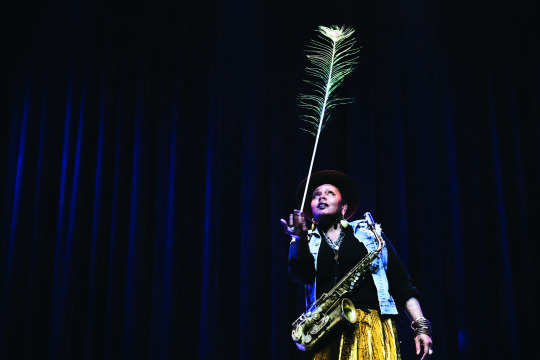
Photo by Anna Niedermeier
This is the fifth album of a projected 12 in Matana Roberts’s Coin Coin series, named after a slave, later activist, Marie Thérèse Coincoin. As with previous volumes, Coincoin’s biography intermingles with folk tales, slave stories and songs, and discussions of the rich, often tragic, history of African Americans. Another element of the Coin Coin series is the relationship between past and present. In this case, the overturning of Roe v. Wade in the present mirrors the story of an illegal and fatal abortion conducted on one of Roberts’s ancestors. In the notes, she says,"I wanted to talk about this issue, but in a way where she gets some sense of liberation.” Rather than being shamed, as so many women currently are in the wake of the SCOTUS decision, in the lyrics Robert’s relative is described as, “electric, alive, spirited, fire, and free.”
Roberts is a versatile artist, a saxophonist and composer who not only works in musical contexts but in theater, fine arts, and poetry. The spoken word portions of Coin, Coin Chapter Five are performed by Roberts and poet Gitnajali Jain. The balance of spoken word and music is well-conceived. The music itself is performed by a host of prominent musicians and produced by Kyp Malone (TV on the Radio). Roberts covers a number of instruments in addition to saxophone, Darius Jones plays alto saxophone, Matt Lavelle, clarinet and trumpet, Mazz Swift, violin, Stuart Bogie, clarinet and bass clarinet, and Mike Pride and Ryan Sawyer play drums and percussion. Pretty much all the performers play tin whistles and sing.
Free jazz is an important component of Robert’s music-making, and it is here in abundance on “Different Rings,” “Shake My Bones,” and “Predestined Confessions.” The arrangements of these complex pieces are well wrought throughout. “A Caged Dance,” trades a gorgeous post-bop solo with dissonant interjections, providing a polystylistic framework. This is not unique to “A Caged Dance.” A number of pieces combine different idioms. Malone’s synthesizer and Pride and Sawyer’s rockist drumming move the piece outside the jazz tradition. The chorused vocals that sing rounds and the children’s folk song, “All the Pretty Horses,” create some of the most memorable music on the album.
The closing track, “Ain’t I … Your mystery is our history,” with its plethora of tin whistles and jangly percussion, recalls both avant-classical and African music. It is significant that Roberts returns to a bespoke instrumentation and non-Western sound world to send the piece home. Less than halfway through, the Coin Coin series is engaging and ever new. Seven more installments: one is eager to hear what is next.
Christian Carey
#matana roberts#coin coin chapter five#in the garden#constellation#christian carey#albumreview#dusted magazine#saxophone#jazz#sound collage#avant garde#experimental#Marie Thérèse Coincoin#african american history#Bandcamp
12 notes
·
View notes
Text
English Literature speedrun notes
Tissue
“Tissue” - thin paper and human skin (fragility of humans)
“Paper that lets the light shine through, this is what could alter things” - reference to religious texts paper, light as Jesus and Allah (power of religion) - or coexistence with nature
Enjambment- freedom, lack of control of humans
Free verse- same thing
“Let the daylight break through capitals and monoliths” - power of nature, criticism of authority, weakness of humans (any idea what techniques are here??) (personification I guess)
“The sun shines through their borderlines” - nature overcomes human segregation (identity, criticism of war, power of nature) sibilance shows power
“fly our lives like paper kites” - childish metaphor, mocking control of money over life (criticism of authority)
“the back of the Koran” - non English spelling shows her holding onto her own identity,
“Transparent” - repetition, criticism of dishonesty of authority
Exposure
“Merciless iced east winds that knive us” - personification of wind shanking people (first line not about war but nature- more significant) (power of nature)
ABBAC rhyme, structure is built only to be taken down (tension of soldiers expecting fight but let down)
Pararhyme- unsatisfying for reader, reflects how the soldiers are always nervous but never get to chill
“For love of God seems dying” fukcking Lord ok
The soldier’s love of God is dying
God’s love for the soldiers is dying
To show love of God, you should die
Epistrophe “but nothing happens” cyclical structure, stuck in suffering
“a dull rumour of some other war” reference to the Bible and Armageddon, metaphorical end of the world for the soldiers bc suffering
“sudden successive flights of bullets streak the silence” - sibilance represents sound of bullets, jolting reader out of relative lack of noises, feel like soldiers
“forgotten dreams” - juxtaposition, loss of hope, forgotten dreams on purpose to be less sad? war made them forget?
History Boysssss (homosexuals)
“Enemy of education” war metaphor and alliteration, opposition between true understanding of literature and grades only used shallowly
“a fact of life” indisputable and unchangable, in opposition with Irwin’s views on history (truth does not matter to him until now?)
Drummer Hodge: Intertextuality, Tom Hardy (the poet) represents Hector, sympathising with the ordeal of the youth, Drummer Hodge represents the Boys, thrown into the chaos of life
“She’s my western front” war metaphor objectifies Fiona, [my] personal pronoun further expresses how women were seen as objects to be owned
“… all the other shrunken violets you people line up” [you people] segregates gay people, [shrunken violets] derogatory language
“Some of the literature says it will pass” looking to literature for solace and comfort during a sexuality crisis, sad gay energy
“All literature is consolation” Dakin changes his mind on literature symbolising him changing to Irwin’s side. No need to look for solace in literature when he is a successful bisexual
Parallels with “all knowledge is precious” from Hector
5 notes
·
View notes
Text
Make perfect the present END and EPILOGUE!

Make perfect the present || Dream of the Endless/Hob Gadling || Explicit || 18/18
Alternate Universe - Western, Non-Traditional Alpha/Beta/Omega Dynamics, Alpha/Beta/Omega Dynamics, Western, Cowboys & Cowgirls, Historical References, Probably inaccurate horseback riding, Poetry, References to Oscar Wilde, Period-Typical Sexism, Victorian Attitudes, Gender Identity, Gender Issues, Attempted Sexual Assault, Gun Violence, Blood and Violence, Rap Battles, Bandits & Outlaws, Masturbation, Vaginal Sex, Vaginal Fingering, Anal Sex, Anal Fingering, Pining, BAMF Hob Gadling, Hob Gadling Saves Dream of the Endless | Morpheus from Roderick Burgess, POV Dream of the Endless | Morpheus, Kidnapping, Period-Typical Racism, Plot-Resistant Perfume, Angst with a Happy Ending
In the summer of 1895, Morpheus Sanfin – poet, omega, and disappointment to his wealthy father – flees England on the heels of Oscar Wilde's imprisonment for gross indecency out of fear that he will be condemned for the same unnatural urges.
Seeking a new life in America away from the stifling hand of his father and the expectations of his sex, Morpheus sets out for California with Hob Gadling, a mustang driver who agrees to guide him, not knowing that along the way they will encounter natural wonders, the ghosts of their pasts, and perils that will force Morpheus to reconcile with both his sex and his feelings for his new companion.
Chapter 17 and 18 AO3!
The fantastic header is from art done by @fishfingersandscarves. Thank you so much darlin for letting me use it <3
#the sandman#dreamling#dream of the endless#hob gadling#my fic#dream/hob#dream of the endless/hob gadling#alpha/beta/omega verse#western AU#cowboy AU
91 notes
·
View notes
Text
"The Master's Tools Will Never Dismantle the Master's House" - Audre Lorde
These are the quotes I found most powerful/most important that really stood out to me while I was reading.
Poetry is not a Luxury
"The quality of light by which we scrutinise our lives has a direct bearing upon the product which we live"
"For each of us as women, there is a dark place within where hidden and growing our true spirit rises."
"The woman's place of power within each of us is neither white nor surface; it is dark, it is ancient, and it is deep."
"I speak here of poetry as the revelation or distillation of experience, not the sterile word play that, too often, the white fathers distorted the word poetry to mean - in order to cover a desperate wish for imagination without insight."
"We can train ourselves to respect our feelings and to transpose them into a language so they can be shared."
"We can sometimes work long and hard to establish one beachhead of real resistance to the deaths we are expected to live, only to have that beachhead assaulted or threatened by canards we have been socialised to fear, or warned to seek for safety. Women see ourselves diminished or softened by the falsely benign accusations of childishness, of non-universality, of changeability, of sensuality."
"The white fathers told us: I think, therefore I am. The Black mother within each of us - the poet - whispers in our dreams: I feel, therefore I can be free."
Uses of the Erotic
"In order to perpetuate itself, every oppression must corrupt or distort those various sources of power within the culture of the oppressed that can provide energy for change."
"We have been taught to suspect this resource, vilified, abused, and devalued within western society. On one hand the superficiality erotic has been encouraged as a sign of female inferiority; on the other hand, women have been made to suffer and feel both contemptible and suspect by virtue of its existence."
"The erotic has often been misnamed by men and used against women. It has been made into the confused, the trivial, the psychotic, the plasticised sensation.For this reason, we have often turned away from the exploration and consideration of the erotic as a source of power and information, confusing it with its opposite, the pornograohic."
"For the erotic is not a question of what we do; it is a question of how accurately and fully we can feel in the doing."
"I am speaking here of the necessity for reassessing the quality of all aspects of our lives and of our work, and how we move through them... When I speak of the erotic, then, I speak of it as an assertion of the lifeforce of women; of that creative energy empowered, the knowledge and use of which we are now reclaiming in our language, our history, our dancing, our loving, our work, our lives."
"Another important way in which the erotic connection functions is the open and fearless underlining of my capacity for joy."
"For once we begin to feel deeply all the aspects of our lives, we begin to demand from ourselves and from our life-pursuits that they feel in accordance with that joy which we know ourselves to be capable of. Our erotic knowledge empowers us, becoming a lense through which we scrutinise all aspects of our existence, forcing us to evaluate those aspects honestly in terms of their relative meaning withing our lives. And this is a grave responsibility, projected from within each of us, not to settle for the convenient, the shoddy, the conventionally expected, nor the merely safe."
"The fear that we cannot grow beyond whatever distortions we may find within ourselves keeps us docile and loyal and obedient, externally defined, and leads us to accept many faucets of our oppression as women."
"When we look the other way from our experience, erotic or otherwise, we use rather than share the feelings of those who participate in the experience with us. And use without consent of the used is abuse "
"...we use each other as objects of satisfaction rather than share our joy in the satisfying, rather than make connections with our similarities and differences."
The Master's Tools Will Never Dismantle the Master's House
"It is a particular academic arrogance to assume any discussion of feminist theory without examining our many differences, and without a significant input from poor women, Black and Third World women, and lesbians."
"What does it mean when the tools of a racists patriarchy are used to examine the fruits of that same patriarchy? It means that only the most narrow perimeters of change are possible and allowable."
"Advocating the mere tolerance of difference between women is the grossest reformism. It is a total denial of the creative function of difference in our lives."
"Difference is that raw and powerful connection from which our personal power is formed."
"As women, we have been taught either to ignore our differences, or to view them as causes for separation and suspicion rather than as forces for change. Without community there is no liberation, only the most vulnerable and temporary armistice between an individual and her oppression. But community must not mean the shedding of our differences, not the pathetic pretense that these differences do not exist."
"For the master's tools will not dismantle the master's house. They may allow us to temporarily beat him at his own game, but they will never enable us to bring about genuine change. And this fact is only threatening to those women who still define the master's house as their only source of support."
"Women of today are still being called upon to stretch across the gap of male ignorance and to educate men as to our existence and our needs. This is an old and primary tool of all oppressors to keep the oppressed occupied with the master's concerns."
Uses of Anger: Women Responding to Racism
"Guilt and defensiveness are bricks in a wall against which we all flounder; they serve none of our futures."
"If women in the academy truly want a dialogue about racism, it will require recognising the needs and living contexts of other women."
"Every women has a well-stocked arsenal of anger against those oppressions, personal and institutional, which bought that anger into being. Focused with precision it can become a powerful source of energy serving progress and change."
"But anger expressed and translated into action in the service of our vision and our future is a liberating and strengthening act of clarification, for it is in the painful part of this translation that we identify who are our allies with whom we have grave differences, and who are our genuine enemies."
"Mainstream communication does not want women, particularly white women, responding to racism. It wants racism to be accepted as an immutable given in the fabric of your existence, like evening time or the common cold."
"We cannot allow our fear of anger to deflect us nor seduce us into settling for anything less than the hard work of excavating honesty; we must be quite serious about the of this topic and the angers entwined within it because, rest assured, our opponents are quite serious about their hatred of us and of what we are trying to do here."
"And while we scrutinise the often painful face of each other's anger, please remember that it is not our anger which makes me caution you to lock your doors at night and not to wander the streets of Hartford alone."
"Hatred is the fury of those who do not share our goals, and its object is death and destruction. Anger is grief of distortions between peers, and its object is change."
"Anger is an appropriate reaction to racist attitudes, as is fury when the actions arising from those attitudes do not change. To those women here who fear the anger of women of colour more than their unscrutinised racist attitudes, I ask: Is the anger of women of colour more threatening than the woman hatred that tinges all aspects of our lives?"
"There is work on expressing anger, but very little on anger directed against each other. No tools were developed to deal with other women's anger except to avoid it, deflect it, or flee from it under a blanket of guilt."
"Guilt is only another way of avoiding informed action, of buying time out of the pressing need to make clear choices, out of the approaching storm that can feed the earth as well as bend the trees."
"For women raised to fear, too often anger threatens annihilation."
"But the strength of women lies in us recognising differences between us as creative, and to stand up to those distortions which we inherited without blame, but which are now ours to alter. The angers of women can transform difference through insight into power."
"Oppressed peoples are always being asked to stretch a little more, to bridge the gap between blindness and humanity. Black women are expected to use our anger only in service of other people's salvation and learning. But that time is over."
"If I fail to recognise them [other oppressed groups] as other faces of myself, then I am contributing not only to each of their own oppressions but also to my own, and the anger which stands between us then must be used for mutual empowerment, not for evasion by guilt or for further seperation. I am not free while any woman is unfree, even when her shackles are very different from my own."
Learning from the 1960s
"I have been guilty of what many of us are still guilty of - letting the media, and I don't only mean the white media - define the beaters of those messages most important to our lives."
"When we disagree with one another about the solution to a particular problem, we are often far more vicious to each other than to the originators if our common problem."
"Our persistence in examining the tensions within diversity encourages growth towards our common goal."
"Even though we fought common enemies, at times the lure of individual solutions made us careless of each other. Sometimes we could not bear the face of each other's differences because of what we feared these differences might say about ourselves."
"We do not have to romanticise our past in order to be aware of how it seeds our present. We do not have to suffer the waste of an amnesia that robs us of the lessons of the past rather than permits us to read them with pride as well as deep understanding."
"If we are to keep the enormity of the forces aligned against us from establishing a false hierarchy of oppression, we must school ourselves to recognise that any attack against Blacks, any attack against women, is an attack on all of us who recognise our interests are not being served by the systems we support."
"Can any of us here still afford to believe that efforts to reclaim the future can be private or individual? Can anyone here still afford to believe that the pursuit of liberation can be the sole and particular province of any one particular race, or sex, or age, or religion, or sexuality, or class?"
"Revolution is not a one time event."
"You do not have to be me in order for us to fight alongside each other. I do not have to be you to recognise our wars are the same... We must allow each other our differences at the same time as we recognise our sameness."
#feminist reading#the master's tools will never dismantle the master's house#Audre Lorde#audre lorde#radfem#radical feminism#radical feminists please interact#radfems please interact#radfems do interact#ref#feminism#quotes#intersectionality#intersectional feminism#radfems please touch#radfems do touch#radfem safe
34 notes
·
View notes
Text
SOMEONE, I SAY, WILL REMEMBER US
It is said that the poet Sappho invented the lesbian sometime between c.620 and 570 BCE. Men had been screwing each other for a while by then. We know this is true because it had been written about (by men), sung about (by men) and encouraged (by women repulsed by men).
Since then, historians have pretended that Sappho was just fond of her students in a totally non-sexual way. Sure, she may have written over ten thousand lines of dazzling verse about same-sex attraction, but that doesn't prove anything, does it?
So the lesbian disappeared and didn't re-emerge until Ellen DeGeneres said, 'Yep, I'm gay' on the cover of TIME magazine in 1997. Ellen explained that there were more of her kind and that they looked just like everybody else but because she was a comedian, the Western world thought she was joking. As it became clear this wasn't a joke, they killed her... career.
That is the history of lesbianism. The end.
My theory goes as follows. Before Sappho before literacy, life was quite simple. Back then, a long time ago, a really long time ago, between forty thousand and fourteen thousand years ago, everybody was shagging everybody, all holes were goals, and days were spent drawing pictures in caves. The concept of fidelity, identity, sexuality and gender were non-existent, and, best of all nobody gave a toss.
Sometime later, let's say around 9000 BCE, things changed. Days were spent constructing homes, farming and forging stable relationships. There were men, there were women, there were penises and there were vaginas. But still, nobody minded who went with who and what went with what. They were quite happy to just get on with it. Men and women were equal, it was a solid 26 C from June through to September,' and nobody had to unstack the dishwasher.
One day, around 3200 BCE, someone, probably a woman, invented a writing system that evolved into several different languages all over the world. Not long long after that, a man used this literary development to write a letter to male friend. In that letter, he joked that women were bad writers, especially when compared to men. It probably went something like this:
Ides of May, 3 150 BCE
Dear Ryan,
How are you doing? Just a thought, do you think that women should stop having sex with each other? It doesn't include us, and I'm worried they might like it better. Maybe we should stop having sex too. But only if you want to.
Say hi to your mum!
Kev x
Female same-sex desire was eventually deemed abnormal, immoral, perplexing and, worst of all, gross. It soon became easier to pretend it never existed and inventing history became another beloved pastime of the patriarchy.
Fragment from: A short history of Queer Women by Kirsty Lodhr
#a short history of queer women#kirsty loehr#queer#queer women#lesbians#books#lgbt books#lgbt#pride#queer books#queer history#queer love#literature#contemporary literature#sapphic history#sappic
23 notes
·
View notes
Text
Latin influence in the English Language


Latin influence on English
Latin influence in the English Language and vocabulary through the centuries. A computerised study and statistical analysis.
English belongs to the Anglo-Frisian group within the western branch of the Germanic languages, a subfamily of the Indo-European languages. It is related most closely to the Frisian language, to a lesser extent to Netherlandic (Dutch-Flemish) and the Low German (Plattdeutsch) dialects, and more distantly to Modern High German. Therefore English is a Germanic language, having a grammar and core vocabulary inherited from Proto-Germanic. However, a significant portion of the English word hoard comes from Romance and Latinate sources. Estimates of native words (derived from Old English) range from 20%–33%, with the rest made up of foreign borrowings. (These estimates, however, are based on the total raw counts of dictionary entries, where the frequency of use for most non-native words is low to nil.
The English vocabulary has increased greatly in more than 1500 years of development. The most nearly complete dictionary of the language, the Oxford English Dictionary (13 vol., 1933), a revised edition of A New English Dictionary on Historical Principles (10 vol., 1884-1933; supplements), contains 500,000 words. It has been estimated, however, that the present English vocabulary consists of more than 1 million words, including slang and dialect expressions and scientific and technical terms, many of which only came into use after the middle of the 20th century. The English vocabulary is more extensive than that of any other language in the world, although some other languages - Chinese, for example - have a word-building capacity equal to that of English.
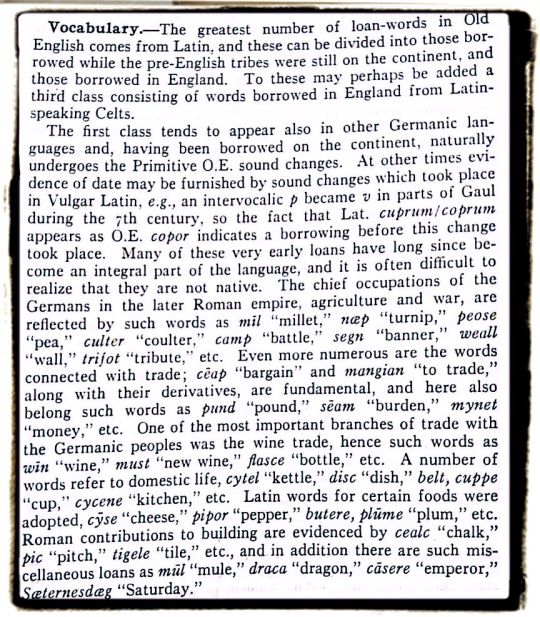
English and Latin
Extensive, constant borrowing from every major language, especially from Latin, Greek, French, and the Scandinavian languages, and from numerous minor languages, accounts for the great number of words in the English vocabulary. In addition, certain processes have led to the creation of many new words as well as to the establishment of patterns for further expansion. The true percent of native words used in everyday spoken and written English actually ranges from 75%–90%.
A large number of these borrowings come directly from Latin, or through one of the Romance languages, particularly Anglo-Norman and French, but some also from Italian, Portuguese, and Spanish; or from other languages (such as Gothic, Frankish or Greek) into Latin and then into English. The influence of Latin in English, therefore, is primarily lexical in nature, being confined mainly to words derived from Latin roots.
The number of Latin words, many of them derived from the Greek, that were introduced during the Old English period has been estimated at 140. Typical of these words are altar, mass, priest, psalm, temple, kitchen, palm, and pear. A few were probably introduced through the Celtic; others were brought to Britain by the Germanic invaders, who previously had come into contact with Roman culture. By far the largest number of Latin words was introduced as a result of the spread of Christianity. Such words included not only ecclesiastical terms but many others of less specialized significance.
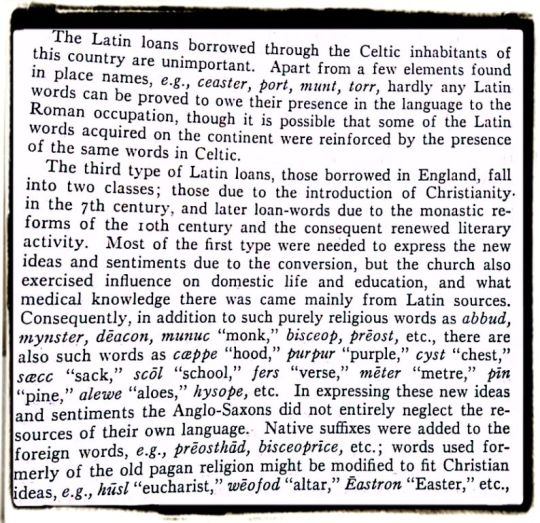
Latin and English
In the early part of the Modern English period the vocabulary was enlarged by the widespread use of one part of speech for another and by increased borrowings from other languages. The revival of interest in Latin and Greek during the Renaissance brought new words into English from those languages. Other words were introduced by English travelers and merchants after their return from journeys on the Continent. From Italian came cameo, stanza, and violin; from Spanish and Portuguese, alligator, peccadillo, and sombrero. During its development, Modern English borrowed words from more than 50 different languages.
For instance, the great poet John Milton, as a Renaissance man, was profoundly familiar with classical learning and his works abounds with classical references, which are often used to describe aspects of Christian belief. The wide use of classical and biblical sources is an important element of what is known as Milton's "Grand style". Other stylistic features contribute to the grandeur of Milton's epic poetry, epic simile for example is a technique he often employs following the Homeric and Virginian style. Another important element is the language he used. In keeping the high seriousness of his subject, he tended to use solemn and rather grandiose language, instead of plain simple English, so he often used words that derived from Latin or Italian, and also his syntax was heavily influenced by these two languages.
Word origins. A computerised survey of about 80,000 words in the old Shorter Oxford Dictionary (3rd ed.) was published in Ordered Profusion by Thomas Finkenstaedt and Dieter Wolff (1973) that estimated the origin of English words as follows:
Influences in English vocabulary Langue d'oïl, including French and Old Norman: 28.3%
Latin, including modern scientific and technical Latin: 28.24%
Germanic languages – inherited from Old English, from Proto-Germanic, or a more recent borrowing from a Germanic language such as Old Norse; does not include Germanic words borrowed from a Romance language, i.e., coming from the Germanic element in French, Latin or other Romance languages: 25%
Greek: 5.32%
No etymology given: 4.03%
Derived from proper names: 3.28%
All other languages: less than 1%
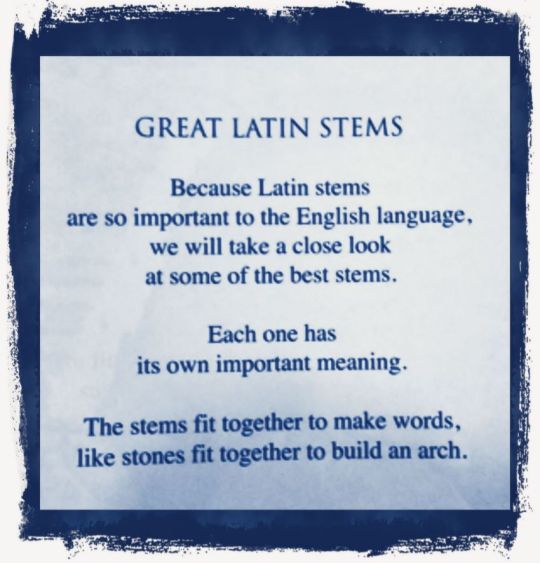
Latin influence on English
A survey by Joseph M. Williams in Origins of the English Language of 10,000 words taken from several thousand business letters gave this set of statistics:
French (langue d'oïl): 41%
"Native" English: 33%
Latin: 15%
Old Norse: 5%
Dutch: 1%
Other: 5%
Based on the above, the percentage of Latin words used in formal business context (15%) is substantially lower than that of the dictionary survey (28.24%) due primarily to the effects of linguistic register, where the vast majority of Latin words in English tend to be of a scientific or technical nature, or consist of words which are rarely to never used (i.e. are functionally obsolete).
Loanwords from Latin
The English language has borrowed extensively from the Latin language beginning during the Germanic period before English was English through the Old English period and up to the early Modern English period. The earliest Latin loanwords date from the period before the Germanic tribes invaded England under invite from the Britons. Latin borrowings continued throughout the Old and the Middle English period, above all Latin influenced the new English language thanks to the literary works of Geoffrey Chaucer, because he knew Latin, French and Italian and admired the main authors who wrote in these languages. English again borrowed heavily from Latin during the Early Modern period that coincides closely with the revival of learning of the Renaissance and with the great dynasties of Tudor (1485–1603) and Stuart (1603-1714) during which many scholars imported many Latin loanwords. Although English is a Germanic language, many common and everyday words are of Latin origin.

Latin influence on English
List of Latin Loanwords
With all the loanwords borrowed from Latin into English, an exhaustive list would be too lengthy to be possible. The following are some of the commonly used Latin loanwords in English:
Agile, abdomen, album, alien, anatomy, animate, animosity, anchor, annual, apostle, area, audio, bacteria, bonus, bovine, butter, Caesar, cancer, canine, capsule, cervix, chalk, cheese, circle, circus, city, civil, chest, church, comet, compensate, color, colossus, complex, consider, contemplate, data, decide, dexterity, deity, discus, disc, disciple, dish, disk, domestic, ego, emperor, equilibrium, erupt, et cetera, excavate, expensive, fauna, feline, feminine, fictitious, flora, floral, formula, fungus, general, genius, genus, gradual, habitual, habitat, honor, id, ignite, immoral, immortality, inertia, infinite, ingenious, insane, interim, janitor, judge, kettle, kitchen, lachrymose, latex, legal, libido, lingua franca, literature, lunar, manual, master, martyr, media, meditate, memento, memorandum, memory, mile, minus, moment, momentum, moral, noble, nocturnal, notorious, opera, orbit, ovum, paper, patron, pauper, pavement, pendulum, peninsula, pepper, percent, persona, physician, plus, pound, propaganda, referendum, regal, revise, rural, sack, series, sex, sickle, similar, simile, status, stimulus, street, subpoena, superego, superintendent, tabula rasa, temple, title, ultimate, vehicle, verbatim, vertigo, vice versa, video, vindicate, wall, wine.
Learn more visiting these useful websites:
https://www.latin-english.com Latin English Dictionary
https://www.etymonline.com Online Etymology Dictionary
You can download the following books on Latin at this page:
Latin Language: Bennett, Charles E.: New Latin Grammar;
D'Oogle, Benjamin L.: Latin for beginners;
Wine, women and songs. Medieval Latin Student's Songs, including translation and commentary by John Addington Symonds.
Or read other articles about the English Language and Literature:
Christianization of Britain, a full article
English, Greek and Latin, a complete article
The Latin Language, a short history
Italian influence on English
English Renaissance, the revival of learning
Short History of the English Language
The essence of English Grammar
Language and grammar
In defence of grammar
The importance of grammar
Short History of the Origin of English
English words origin and vocabulary
History-of-the-English-Language.pdf
British-history-milestones-synthesis
Questions-about-the-english-language
History-of-English-Literature-Summaries.pdf
British_literature_history_chart_summary.htm
General_literature_history_chart_summary.htm
American_literature_history_chart_summary.htm
British_english_history_timeline.htm
http://www.youtube.com/watch?v=_6eYkDhH61Y
More videos;
Latin, the key to English
Latin influence on English
Latin and Greek roots
Read the full article
#Anglo-Norman#dictionary#English#entries#French#germanic#language#latin#loanwords#OldEnglish#OldNorman#Oxford#Romance#words
4 notes
·
View notes
Note
Hello. As you know, I love your work and I love your ocs just as much! I can't tell you how happy I was when you mentioned Hokusai's work within your work. So let me thank you first for that!
Now, if it doesn't bother you, may I ask you a question about Toshihiro? As I recall, his way of speaking is influenced by haiku, right?
✉️
(1)If the little cuckoo doesn't sing, I will kill it.
(2)If the little cuckoo doesn't sing, I will make it sing.
(3)If the little cuckoo doesn't sing, I will wait for it to sing.
(4)If the little cuckoo doesn't sing, I will let it go.
These are the most famous haiku in Japan. There are four very famous warlords in Japan, they lived in the same era, and all four have different personalities. A poet wrote haiku about the case when they kept a little cuckoo as a pet and its little cuckoo did not sing as they expected.
(1)represents a short-tempered and brutal personality that is quick to kill those who do not get its way.
(2)represents the ability to think out of the box and accomplish what others think is impossible.
(3)represents the ability to persevere and wait for an opportunity to present itself.
(4)represents a character that is very considerate of one's friends, but is cruel to one's enemies.
Which of the above describes Toshihiro? If he does not fit any of them, how does he treat his little cuckoo?
Sorry for the long message. I look forward to your work. Have a good day!
First off, thank you for your support and your kindness. I always like to receive asks and the like, so don't feel bad about sending one, short or long. I always enjoy reading your comments in the tags too, they make me happy. This is a long answer.
1. Creation and design
Now to the topic, after @R3d1ke gave me the ideas for the names, that I never would have thought of by the way. I would have likely given them more western names which would have clashed with what the Nyakuza are supposed to represent in the first place, a Japanese cat mafia. I decided that one of the characters should be more Japanese themed, if that makes sense. I kind of created Toshihiro based off of the good stereotypes we Germans have for the Japanese, politeness, kindness, honor and a serious demeanor are associated with them here, so I decided that he should show those traits...at least on the outside.
He is supposed to show a front of a kind and polite, but a bit eccentric cat that loves art, which isn't entirely inaccurate, more on that later. His design, in my mind at least, you know that I can't draw well, was based on the same concept of a polite Japanese man. He wears a kimono, the pattern on it is inspire by the waves of The Great wave of Kanagawa'. To make him more interesting, I made him speak in haiku like the firefly NPCs in the level 'Spooky Swamp' in one of my favorite games of all time 'Spyro: Year of the dragon” which is the third installment in that series. The characters there have their text boxes show three sentences; the first one has five, the second seven, and the last five syllables again. It made his sentences hard, but fun for me to write and gave the character more personality, it was especially hard to not make the sentences to...simple, for the lack of a better word. Toshihiro was still supposed to sound like a sophisticated man, and not like a toddler that just learned to speak.
I'm really happy that you as a Japanese enjoyed that character, as I was trying to make my characters more diverse and interesting. Nozomi being a mix out of the crazy scientist and cold and calculated secretary archetypes, and Maemi being a non-binary character for example. I just hope that I didn't put anything that could be offensive in there, I know that my little fanfics don't reach a lot of people, but I do care about the few that read them and want them to be comfortable. I do have a tendency to write heavier subjects into my longer stories though, there is no good story without conflict after all.
That covers his creation and design.
2. His personality and backstory
As mentioned earlier, Toshihiro's outward appearance and demeanor reflect how we perceive the Japanese in my country, he is dignified, polite and kind, but that is mostly a front for his more...violent behavior. In reality, he is a calculated and very dangerous cat that annihilates every obstacle in his path. This can be seen in how he easily saw through Bow's diguise and knew that they were coming for him, so he sent his underlings out to deal with other adversaries while he wanted to take care of Bow personally. His underlings, by the way, are based off of ninjas as you see them in modern fiction, stealthy and deadly, I gave them weapons to reflect that too in form of the shurikens and kunais they use. The former being more of a ranged weapon while the latter is more of a melee weapon if I remember that right.
The Toshihiro in the story is a cold-hearted individual, who was once a kind and innocent soul, but his father and his peers tainted his character.
Bow in the story quickly realizes that something sinister and dark hides behind his eyes, something traumatic, and she isn't wrong. When he was a child, Toshihiro witnessed his father kill his own mother brutally, he was too young to properly remember that now, but that trauma is subconsciously still with him. Toshihiro was fond of art his whole life and really enjoyed drawing and painting, yet his father wanted him to take on the family business, like many parents of large companies want their first-born kids to do. He, however, wanted to become and artist, a dream that his father quickly destroyed by making sure to burn all his art supplies, so he could only ever draw at school. He didn't have it easy there either as the other kids made fun of him for speaking formally and more like a person much older than him would, that and the fact that to them he was the spoiled rich kid. His classmates bullied him and at home he was terrorized by his father...so when one day Empress found him on the streets and talked to him back when they both were roughly teenagers and told him to just do whatever he wanted to do, he took that to heart. He worked on improving his art, cutting the ties to his father as soon as he could. He later joined Emrpess's gang of cats, being deeply loyal to her for helping him. Toshihiro is known to be a bit of a freespirit, but he always completes his missions with perfect results...He just underestimated Conductor's accuracy and perseverance in the end.
While he was with the Nyakuza, he was polite to his allies, but emotions and feelings other than anger and coldness were simply...lost due to the trauma and the poor treatment he endured, he simply couldn't be compassionate anymore, that part of him was destroyed by both his father, and the cruel children that ridiculed him.
3. How he would treat that little cuckoo
Being that his compassion has been practically beaten out of him, he would likely kill it for not serving its purpose. His former self would have patiently waited until the cuckoo would sing its song.
In summery, he does care for his allies to some degree, but can no longer feel empathy. His sense of loyalty binds him to Empress, as he feels he has to repay the dept he owes her.
He kills his enemies with no remorse, he has some twisted sense of honor though, as he prefers to use his wit and more conventional means to beat his enemies. Kind of like a samurai refusing to wield a gun even if it was the more effective weapon, as his honor and pride wouldn't allow him to even if he died.
-
Well, that certainly was a long ask to answer, but I had fun going into depth and fleshing out my characters more. I kinda wished that I had thought of those three (Nozomi, Toshihiro and Maemi) earlier, but I'm never too confident in writing any Ocs into my works, because I don't know if people can engage with the character and find them fun to read about.
If you have some time, could you tell me how you felt when you read my attempt and including a Japanese-themed character? Was I offensive or did I do an okay job and made him fun to read about, even if he was just there for 2 chapters? I might try to include more Ocs in my stories if people like them.
Thank you for your ask and your nice words again, it meant a lot to me. I always love your art, even if I only reblog sometimes and not write anything in the tags, I will try to write more in the tags next time. Have a good day or night!
10 notes
·
View notes
Note
Hey! So I've used Gregg Sulkin for a character for years. I don't follow him on Instagram but ended up on his today, only to see him a part of the propaganda machine of western actors / celebrities going across to 'see the effects of October 7' to try find ways to publicly justify genocide. For obvious reasons, I have no interest in using him moving forwards, so just looking for alternative faces with that similar preppy bro vibe at ~30 years old. Thank you! (For this and all your work)
Chella Man (1998) Hongkonger and Jewish - is deaf, trans genderqueer and pansexual (he/they).
Lucas Jade Zumann (2000) Ashkenazi Jewish / possibly German.
also, the older suggestions have younger resources!
Joel Kim Booster (1988) Korean - is gay and has bipolar disorder.
Laith Ashley (1989) Afro Dominican - is a trans man and asexual.
Ramy Youssef (1991) Egyptian.
Vico Ortiz (1991) Puerto Rican - is non-binary (they/them) and polyamorous.
Younes Bendjima (1993) Algerian.
Mustafa the Poet (1996) Sudanese.
Brandon Soo Hoo (1995) Chinese.
Leo Sheng (1996) Chinese - is a trans man.
Omar Apollo (1997) Mexican - is gay.
Archie Renaux (1997) Punjabi Indian and Brtish.
Zoe Terakes (2000) Greek Australian - trans masc non-binary guy (they/he).
Hey anon! He's unfortunately been on my private no-no list for a while because of the atrocious things he's been posting but to my knowledge all of these suggestions are pro Palestine so I hope you find somebody suitable to replace him with. 💌
3 notes
·
View notes